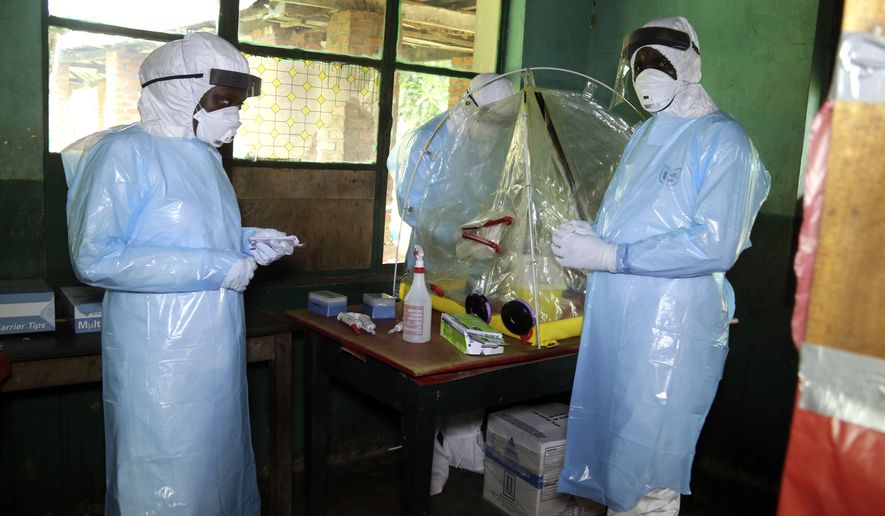The Ebola outbreak in Congo has “largely been contained,” the World Health Organization says, leaving scientists optimistic that a mix of conventional disease-fighting tactics and trial vaccines was able to avert another global panic.
The last confirmed infection was diagnosed nearly a month ago, and Doctors Without Borders is preparing to withdraw aid workers from the region because of the progress.
Health officials said about 50 infections were detected and 29 deaths were attributed to the outbreak, which was discovered in early May.
They are waiting until later this month to declare the outbreak over — after at least six weeks, or two incubation periods, have passed since the last infection.
“Until that time, it is critical that we remain in active response. There is no room for laxity or complacency,” WHO spokesman Tarik Jasarevic said.
The public health arm of the United Nations took a proactive and cautious approach to the Congo outbreak. WHO vowed to avoid mistakes of 2014, when an outbreak in West Africa was recognized too late. The disease swept into major urban centers and ultimately killed more than 11,000 people before it petered out in 2016.
A paper in The Lancet, a British medical journal, scrutinized Congo’s response and found “key areas of progress” since the fumbled response earlier this decade.
Patients were admitted to hospitals within a day of the onset of the illness, compared with an average of five days during the West African outbreak.
Had the response been similar five years ago, data models suggest, it “could have averted thousands of deaths from Ebola virus disease in West Africa, many outside the doors of treatment centers that were already operating at capacity,” Joseph A. Lewnard, a research fellow at the Harvard TH Chan School of Public Health, wrote in a commentary alongside the Lancet paper.
Ebola is transmitted to people from wild animals and spreads from human to human through the bodily fluids of people who exhibit symptoms.
It is endemic to Congo, which has recorded nine outbreaks since the virus was discovered in 1976.
The first cases of the latest outbreak appeared in an incredibly remote part of Congo, and the discovery of cases in the urban center of Mbandaka sparked fears that it would travel up and down the Congo River, a major regional artery, and infiltrate neighboring countries.
Congolese authorities set up exit screenings for the virus at airports, and the Centers for Disease Control and Prevention briefed thousands of U.S. Customs and Border Protection officers to raise awareness of the outbreak.
Scientists say early diagnosis, isolating patients, tracing contacts of infected people and promoting safe burials helped slow the outbreak at its source.
Officials also used a trial vaccine known as rVSV-ZEBOV to vaccinate 3,000 people at risk of infection.
In Mbandaka, vaccine teams reached over 90 percent of the people they recorded as having some type of contact with those who were infected. The success rate was unusually high.
Elsewhere, they had to maintain the doses at minus-95 degrees in special containers on the backs of motorbikes as they traveled to remote areas.
Mr. Lewnard called it “a heroic feat in this first use of the vaccine outside Guinea,” where it proved effective in a 2015 trial after the West African outbreak was in full swing.
WHO officials don’t have a target date for declaring an end to the latest outbreak.
There are different ways to determine whether sufficient time has passed without new lines of transmission. It could be at least 42 days from a survivor’s second negative blood test or 42 days since the safe burial of a patient who died.
“We are cautiously confident regarding the situation and know that a continued aggressive response is required,” Mr. Jasarevic said. “Experience has shown us that it only takes one case to set off a fast-moving outbreak.”
Though the response is continuing, workers on the ground say they have turned a corner. Doctors Without Borders announced this week that it will hand over response activities to the Congolese government and other nongovernmental organizations in the region.
“This Ebola outbreak is not yet officially over, but we are very pleased with the progress that has been made,” said Henry Gray, the French group’s emergency coordinator in Congo’s Equateur province.
“Given the low volume of cases and the increasing expertise of local staff, the Ministry of Health is well-placed to finish the work which we started together.”
• Tom Howell Jr. can be reached at thowell@washingtontimes.com.




Please read our comment policy before commenting.